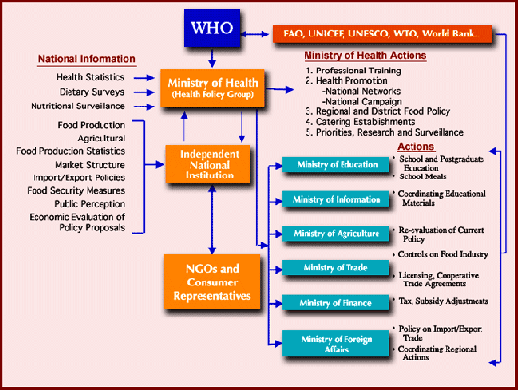
Return to the Monitor front Page
For more information on CECHE and its programs visit CECHE's Homepage

CECHE Chairman Sushma Palmer Comments on This Quarter's Topics

Action, not Reports, Needed to Reverse Diet, Nutrition Woes

 The
"5 A Day" Campaign: Are Americans Listening?
The
"5 A Day" Campaign: Are Americans Listening? Sedentarism
Runs Rampant Worldwide
Sedentarism
Runs Rampant Worldwide
 South
Indian Reproductive Health Tied to Cultural Roots
South
Indian Reproductive Health Tied to Cultural Roots Democracy
and Health Go Hand in Hand
Democracy
and Health Go Hand in Hand
 Guidelines
Dictate Lifestyle Changes for Americans
Guidelines
Dictate Lifestyle Changes for Americans WHO
Is Central to Fighting NCDs
WHO
Is Central to Fighting NCDsDownload a complete Monitor (PDF)
by Professor Kaare Norum, Institute for Nutrition Research, University of Oslo, Norway
The World Health Organization/Food and Agriculture Organization (WHO/FAO) report "Diet, Nutrition and the Prevention of Chronic Diseases" is central to WHO's strategy for diet, physical activity and health, as it provides a solid scientific basis for policy decisions and action items. The report's proposed strategy to prevent NCDs -- prevention is far more cost-effective than treatment -- must consider the impact of issues such as urbanization, and the unhealthy diets and sedentary lifestyle it tends to promote. Interestingly, this prevention could follow much the same policy in both developed and developing countries: healthier diets and enhanced daily physical activity.
The practical steps and measures to prevent NCDs would be different, however. To this end, WHO has consulted with member states in the six regions of the world (Africa, America, the Middle East, Southeast Asia, Europe and the Pacific) to identify problems, and discuss policies and measures best suited to developed and developing nations. For instance, both Norway and Thailand, one developed and one in-transition country, have implemented effective nutrition policies, which could serve as models for other nations.

Norway's policy encompasses increased self-sufficiency on a healthy food supply, regional distribution of health-promoting foods such as vegetables and fruits, and a sustained campaign to reduce saturated and total fat intake, as well as the monitoring of coronary heart disease, high blood pressure and blood lipid concentrations. In Thailand, social, educational, health and agricultural issues have been coordinated at every level of government and coupled with a grassroots campaign. The impact of these policies has been remarkable: In Norway, deaths attributable to coronary heart disease were halved over a 20-year period, and in Thailand the prevalence of underweight preschoolers fell from 50 percent to 10 percent over 10 years.
In addition to pursuing national prevention strategies, WHO is consulting with U.N. agencies, nongovernmental organizations (NGOs) and international food companies to compile a global strategy for diet, physical activity and health. Both global and national strategies must be comprehensive, addressing multiple risk factors, maintaining a long-term perspective and involving all sectors of society with a multidisciplinary and participatory approach. Such strategies must also be part of a larger political effort for better nutrition and public health.
The importance of combining international and governmental policy and public/private partnership to create an environment conducive to appropriate dietary and physical activity patterns cannot be understated. Action should be based on needs assessments and solid evidence; however, baseline data are not easily obtained in many countries. Thus WHO must help, providing the leadership and technical support necessary to achieve this and other goals critical to strategy development and implementation.
The accompanying chart suggests the role WHO should play and the collaboration necessary between WHO, its member states and other U.N. agencies. The chart positions WHO as the leader and the lynchpin, uniting global resources for a common health cause. The Ministry of Health also plays a central role, yet it must collaborate with independent institutions and NGOs to get pertinent data, while partnering with other ministries, all of which are responsible for different tasks and actions. Furthermore, to ensure tangible results, WHO and its member states must encourage food companies to curb their intense marketing of unhealthy fast food, sweet drinks and snacks (especially to children).
The key is collaboration -- and cooperation -- and policies that support these values. No one organization, person or entity can curb a global problem. It is up to teams, partners in program, to wield the scepter of NCD prevention and facilitate world health.
[Next Policy Article]
© 2003 CECHE